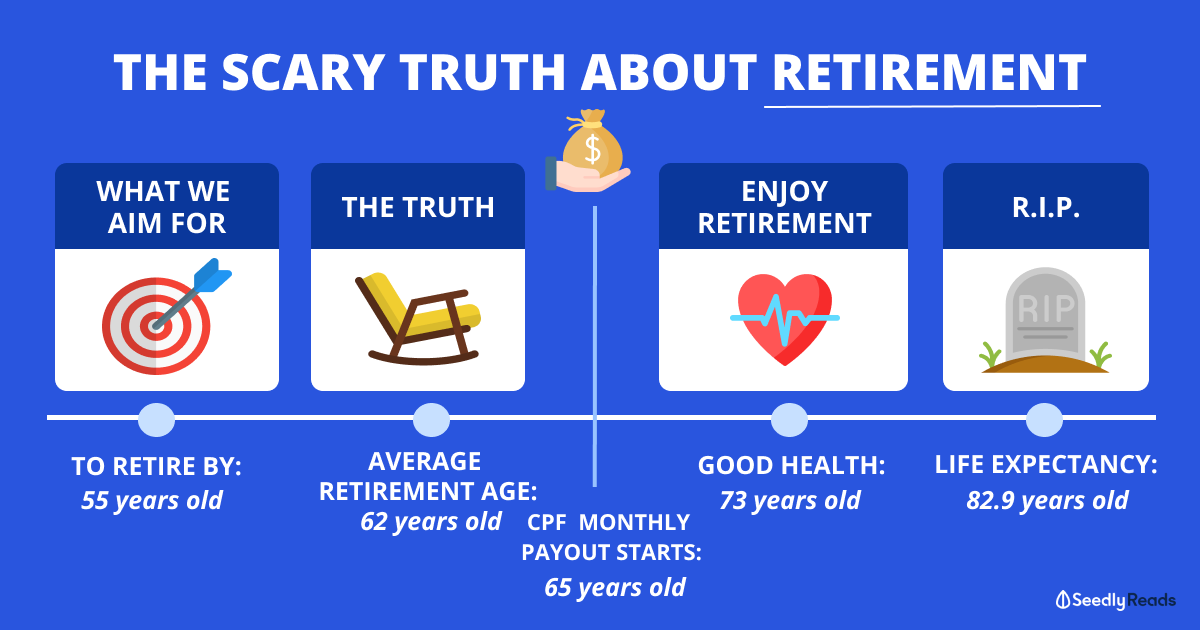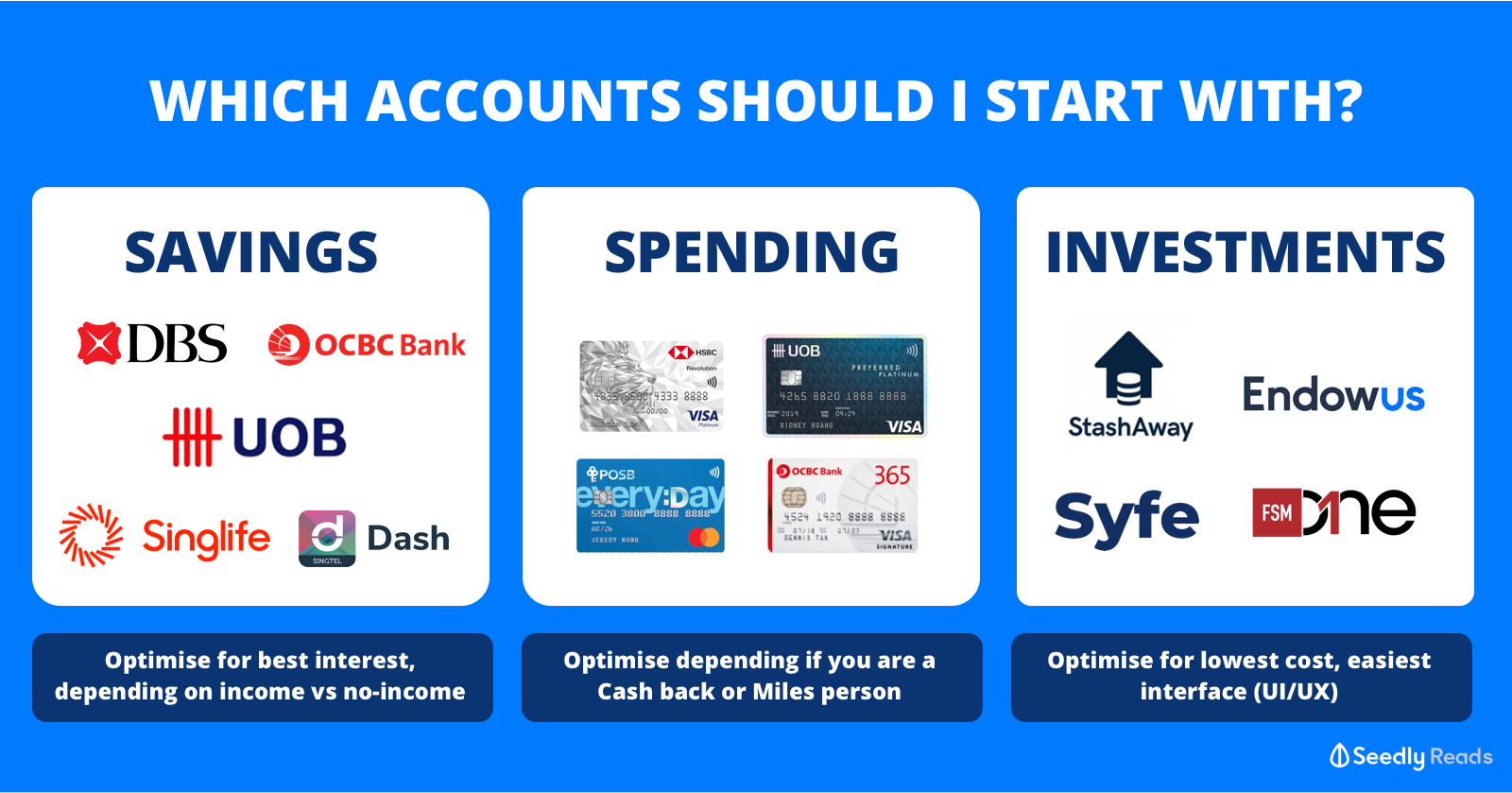Advertisement
Anonymous
I am 23 years old and I did not even save a single cent. I just started working and let’s say my income is about $2K. What are the steps should I take to avoid complications in the future ?
10
Discussion (10)
Learn how to style your text
Reply
Save
Aim to keep your individual daily expenses to below $20 daily for the next 7years.
Learn as much as you can below age 30.
Earn as much as you can after age 30.
dont have much cash when just started working is very normal.
when you have cash, the "financial instruments or investment instruments" will come to you naturally
Reply
Save
Benedict Lau
14 Aug 2020
Student Ambassador 20/21 at Seedly
Hello!
It's never too late to start saving and it's a good step forward recognising that you have to take action to change your circumstances!
First off, if you have any debts (eg. student loans), make sure to pay off those first.
Next, whatever your monthly income, always set aside a percentage of it. It could be 20%, 30% or more. Whatever it is, once you get your salary, make sure to lock it away in a high yield savings account (ie Standchart Jumpstart or RHB High Yields Savings Plus) and do not touch those funds unless it is an emergency (ie hospital bills. Having to buy a branded item is never an emergency). Once you have saved up at least 6 months of your last drawn income you should be relatively safe.
Lastly, you can start investing in regular savings plans or robo advisors. Only invest in what you are comfortable with.
Also, if you are not currently insured, do check with a reliable and trusted agent on what is necessary for yourself.
Hope this helps!
Reply
Save
Better late than never :)
The priority now is to build up your emergency savings (~6months of salary) in a high yield savings account (e.g. OCBC360/Singlife). One good way to save is to lead a frugal lifestyle and only spend on essential stuff.
Next, getting yourself insured with a shield plan and/or Lifeplan+CI coverage. You can ask for suggestions from a good advisor or the seedly committee regarding these.
If you are open to investment , roboadvisor and RSP is ideal in your case as you do not want to spend too much on this at this stage. Keep it below 100 per month but still, building your emergency funds and getting sufficient insurance are priorities first. Only adopt this if you understand your cash flow well and you believe you are disciplined with it .
Savings is your best investment now and all the best! Pick up some side hustle jobs and upgrade yourself with relevant courses to speed up the process.
Reply
Save
Shania Loh
14 Aug 2020
Seedly Student Ambassador 2020/21 at Seedly
Hi Anon!
Do prioritse learning how to budget your income according to savings, needs and wants. Th...
Read 6 other comments with a Seedly account
You will also enjoy exclusive benefits and get access to members only features.
Sign up or login with an email here
Write your thoughts
Related Articles
Related Posts
Related Posts
Advertisement








There's two things I would suggest
1) have two bank accounts, one for saving / general and one for spending. Your atm card should only be tagged on the spending account and cannot access the other one.
2) use ocbc savings goal to "lock" your money into fixed / budget goals.
The first is more practical, and can be done with any bank. The ocbc savings goals are good, but you can't lock too much and you need to create a float for certain deductions (eg your income tax, insurance premiums, loan payments etc). Paying an NSF (insufficient funds) charge for failed deductions is costly and rather dumb because these are avoidable costs.
So what happens with two bank accounts?
Your salary goes to the savings / general, and you can automate the transfer of your allowance to the spending account which you can then draw out.
The concept is if you see only a smaller amount in the spending account, you will slowly adjust your spending behaviour to last for the month based on that lower amount.
What I have done now is weekly transfer of my allowance of 180 per week on each Monday. So I need to make sure that 180 lasts me till the next Monday.
If you have a credit card, my suggestion generally will be to go to the bank, fill up the form, and bring the credit limit down to half or just one month of your salary. This will automatically prevent you from charging too much on the cards, and you should be able to pay the cards in full ideally to avoid the high interest.
Assuming your pay is 2k (before cpf), take home is 1600 per mth. With 13 mth bonus, your income tax should not exceed 200 per year (for now). Some further assumptions will include 12% or 192 per mth for insurance premiums, I would suggest
Take home pay = 1600
Minus budget for insurance = +/- (192)
Minus tax budget = (18)
Minus loan payment =....
Minus household expenses =....
Minus own allowance =....
Minus savings for rewards / travel etc =...
Remaining amount to save for emergency funds and investment.
For now I think you need to balance out the budget, and aim maybe a small amount like 100 for the rewards / travel, and ideally 250 or more for emergency funds / savings / investment. I would guess that should probably mean how much you budget for your own allowance + give to family for household expenses + loan payment = 1000.
Its really up to you to adjust the amounts until its a budget you are comfortable with, but that would be my recommended starting point.
Note: When I first started work long ago, with 2k starting pay, I think my monthly cash flow looked like this
Take home pay = 1600
Monthly Allowance = (500)
Household Expenses = (400)
Insurance premiums = (213)
Mobile (mine and parents) + Internet = (150)
Pay back cpf education loan = (250)
Savings = 87